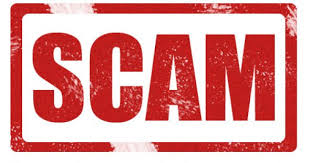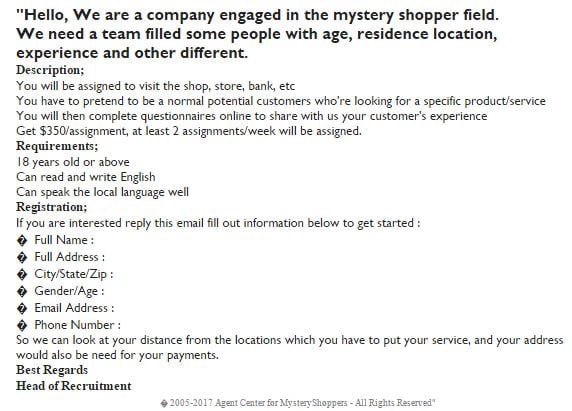 Steven Weisman, Esq. warned against this scam and wrote March 5th:
Steven Weisman, Esq. warned against this scam and wrote March 5th:
"Mystery shoppers are people hired to shop at a particular store and report on the shopping experience for purposes of quality control. Unlike many scams, there actually are legitimate mystery shopper companies, but they never advertise or recruit through emails."
How this scam works is when a victim falls for the recruiting email, they are sent a bogus bank check that the bad guys ask them to deposit and then use for their "mystery" shopping. They spend some of the money on the goods that they buy, and are instructed to keep some of the balance of the check as payment for their services. However, the angle is that the victim gets instructions to return the remaining funds by a wire transfer. Obviously, the check is counterfeit, but the money that the victim transfers by wire is all too real. Here is an example of a recent mystery shopper Scam Of The Week email:

I suggest you send the following to your employees, friends, and family. Feel free to copy, paste, and/or edit:
"Mystery Shopper" scams continue to snare unwary victims. Mystery shoppers are people hired to shop at a particular store and report on the shopping experience for purposes of quality control. Unlike many scams, there actually are legit mystery shopper companies, but they never advertise or recruit through emails. Here is how this scam works:
You get a bank check they ask you to deposit immediately and then go shop, and they say you get to keep some of the money as well. But the scammers ask you to wire the remaining money back to them right away. And as you might have guessed, their check is bogus but the money you wire back is real, and it's yours.
Here is a general safety rule: Whenever you receive a check, wait for your bank to tell you that the check has fully cleared before you consider the funds as actually being in your account. Never accept a check for more than what is owed with instructions to send back the rest which is a major red flag. Last, always be very wary whenever you are asked to wire funds because this is a common theme in many scams.
Let's stay safe out there!
Warm regards,
Stu Sjouwerman
Founder and CEO, KnowBe4, Inc.





